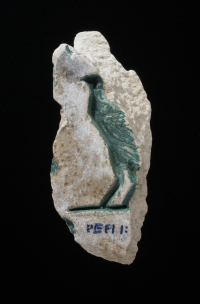



amulet; rectangular pellet bead; jewelry and amulets
An item at Louvre
biface; multiple piercing Decoration: on the front; king (standing, loincloth, flanked by); divinity (4, standing, presenting, scimitar, holding, prisoner); Montu (standing); Thoth (ibis-headed god, standing); falcon-headed god (2, standing); on the back; king (standing, loincloth, uraeus, flanked by); divinity (4, standing, presenting, scimitar, holding, prisoner); Montu (standing, crown of Montu); goddess (standing, disced horns); falcon-headed god (standing, solar disk); Thoth (ibis-headed god, standing)
Department of Egyptian Antiquities
An exhibit at Louvre
The collections of the Department of Egyptian Antiquities present the civilization that evolved on the banks of the Nile, from the end of Prehistory (around 4,000 BCE) to the Christian era (from the 4th century CE).




